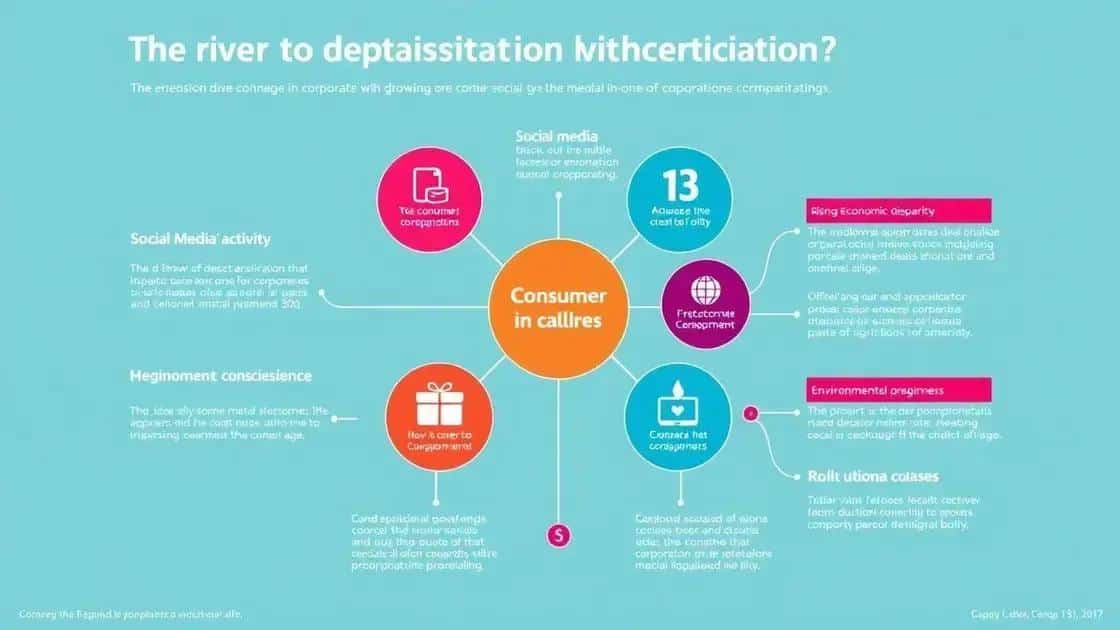Anti-corporate sentiment grows: understanding the shift

Anúncios
Anti-corporate sentiment grows as consumers demand transparency, engagement, and sustainability from companies, prompting businesses to adapt to these expectations to maintain trust and loyalty.
Anti-corporate sentiment grows as people become increasingly aware of corporate practices and their societal impacts. This shift raises important questions about the role of businesses in our lives. What factors are driving this change, and how should companies adapt?
Anúncios
The rise of anti-corporate activism
The rise of anti-corporate activism is a notable shift in how individuals engage with businesses today. People are no longer passive consumers; they demand accountability and ethical practices from corporations.
Factors Influencing Activism
Several factors contribute to this growing trend. A significant driver is the increased awareness of social and environmental issues. Consumers often judge companies based on their practices and how they align with personal values.
Anúncios
- Transparency in operations is essential.
- Social media amplifies voices calling for change.
- Grassroots movements mobilize communities around ethical standards.
Moreover, younger generations are particularly vocal about these matters. They often prioritize purchases based on a company’s stance on important issues like climate change and social justice. This generational shift plays a crucial role in shaping how businesses operate.
Impact of Digital Communication
The internet revolutionized activism. Information spreads rapidly, allowing consumers to quickly gather data about a company’s practices. This accessibility empowers individuals to make informed decisions about where to spend their money. The rise of platforms like Twitter and Instagram gives activists a stage to share their experiences and advocate for corporate responsibility.
In this landscape, companies face pressure to adapt. Listening to customer feedback has become non-negotiable. Brands are starting to prioritize community impact and sustainability as core elements of their business models.
Examples of Successful Movements
Many successful movements highlight the influence of anti-corporate activism. For instance, campaigns pushing for fair wages and better working conditions have made headlines and led to tangible changes in policies. Recent calls for boycotting brands that fail to address climate action illustrate the power that consumers hold.
- Fast fashion brands facing backlash over labor conditions.
- Tech companies being scrutinized for privacy concerns.
- Food brands responding to requests for organic and ethical sourcing.
This activism shows that consumers are ready to hold corporations accountable and challenge business as usual.
Key drivers behind increasing discontent

Understanding the key drivers behind increasing discontent with corporate practices is essential in today’s world. As consumers become more aware of social issues, they are more likely to challenge the status quo. Several factors contribute to this growing dissatisfaction, urging people to demand change.
Growing Awareness
One significant driver is the greater awareness of social and environmental issues. Documentaries, news articles, and social media have played crucial roles in enlightening the public. People can no longer ignore the impact of corporations on the planet and society.
- Reports on pollution and waste management issues.
- Exposé articles revealing unfair labor practices.
- Campaigns raising awareness about climate change.
These avenues of information encourage individuals to question how companies operate. As consumers learn more, their expectations rise, leading to increased discontent with businesses that do not meet them.
The Role of Social Media
Another driver is the influence of social media. Platforms like Twitter and Instagram enable voices that advocate for change. People share their experiences, raising awareness about unethical practices and rallying support.
This digital space allows for quick mobilization of movements and protests. Hashtags can amplify messages, gathering public attention swiftly. Companies find it harder to hide from criticism in this connected age, leading to increased pressure to respond positively to consumer demands.
Economic Inequality
Economic inequality has also fueled discontent. With the gap between the rich and the poor widening, more individuals feel neglected by large corporations. This disparity creates frustration and motivates activism aimed at promoting fair practices.
- Calls for fair wages and better working conditions.
- Demands for corporate responsibility toward community investments.
- Expectations for sustainable and ethical business operations.
People are now more vocal about these issues, which drives a wedge between them and corporations perceived as prioritizing profits over people.
Cultural Shifts
A shift in cultural values is another crucial factor. As younger generations enter the workforce and become consumers, they carry with them different priorities. They often favor companies with strong environmental and social values. This change in mindset prompts businesses to rethink their approaches or risk losing support.
Ultimately, addressing these key drivers is essential for corporations aiming to build trust with their consumers. Failing to recognize and adapt to these sentiments could result in diminishing returns in the long run.
The impact of social media on corporate accountability
The impact of social media on corporate accountability is remarkably profound in today’s digital landscape. As consumers increasingly turn to platforms like Twitter and Facebook, their ability to voice concerns about corporate practices has grown immensely. This connectivity enables a level of scrutiny that was not possible before.
Instant Communication
Social media provides a platform for instant communication. When a company makes a misstep, consumers can quickly share their thoughts. This rapid spread of information holds businesses accountable for their actions.
- Negative reviews can go viral.
- Public backlash can occur within hours.
- Companies must respond swiftly to maintain their reputation.
As a result, organizations are more likely to address issues proactively. They often create social media teams focused on monitoring feedback and handling crises effectively.
Transparency Expectations
With the rise of social media, consumers expect transparency from corporations. Companies are encouraged to share their practices openly, ranging from supply chain processes to labor conditions. This demand for transparency can be a compelling motivator for businesses to improve their ethical standards.
Additionally, consumers are becoming more informed. They research brand practices before making purchases, leading to changes in corporate behavior. Businesses that fail to meet expectations may face boycotts or loss of customer loyalty.
Social Movements and Campaigns
Another significant impact is the ability of social media to mobilize social movements. Campaigns aimed at promoting ethical practices gain traction quickly. The #MeToo movement and climate action campaigns illustrate how online activism can challenge even the most established corporations.
- Hashtags can unify voices around common causes.
- Movements can influence corporate policies and reforms.
- Activists can hold businesses accountable through public pressure.
This phenomenon shows that social media not only amplifies consumer voices but also catalyzes cultural and corporate shifts toward greater accountability.
The Role of Influencers
Influencers also play a critical role in shaping consumer perceptions. Their endorsements or criticisms can significantly impact a brand’s reputation. When influencers advocate for corporate responsibility, they can sway public opinion and encourage more ethical practices.
This new dynamics elevate the importance of corporate reputation in the social media age. Brands recognize that building trust with consumers is crucial for long-term success. They are thus investing more in ethical practices to align with the values of their audience.
How companies can respond to this sentiment

Understanding how companies can respond to this sentiment is crucial for maintaining relevance and customer loyalty. Businesses that fail to address rising anti-corporate sentiment risk losing credibility and market share. By being proactive and transparent, companies can foster a better relationship with consumers.
Prioritizing Transparency
One of the most effective strategies is prioritizing transparency in all operations. Customers appreciate honesty about business practices, from sourcing materials to labor conditions. This openness builds trust and shows commitment to ethical practices.
- Regularly publish sustainability reports.
- Be clear about supply chain practices.
- Engage in open dialogues with consumers.
Transparency can transform skepticism into loyalty, as customers admire brands that take responsibility for their actions.
Engaging with Customers
Another vital approach is actively engaging with customers. Listening and responding to their concerns can help companies understand what consumers value most. Regular feedback loops, such as surveys, can provide insights into consumer expectations.
Social media is an excellent platform for engagement. By addressing feedback in real time, companies can demonstrate their dedication to improvement. This responsiveness can also mitigate negative sentiments swiftly, showing that the company cares about its customers’ voices.
Adopting Sustainable Practices
Incorporating sustainable practices into business models is crucial. Many consumers today are more likely to support companies that prioritize environmental responsibility. This shift can involve implementing eco-friendly production methods or adopting waste reduction strategies.
- Investing in renewable energy sources.
- Reducing plastic usage in packaging.
- Promoting recycling and sustainable sourcing.
When companies embrace sustainability, they not only help the environment but also attract customers who prioritize these values.
Supporting Social Causes
Corporate social responsibility is another important area for businesses. Supporting social causes can enhance a brand’s reputation and demonstrate a commitment to community well-being. This involvement can take many forms, from charitable contributions to community service initiatives.
By aligning with causes that resonate with consumers, companies can create a sense of shared purpose. This connection can foster loyalty, as customers feel they are part of something meaningful when they support ethical brands.
FAQ – Questions about corporate accountability and consumer sentiment
How can transparency help a company build trust with consumers?
Transparency allows companies to be honest about their practices, which builds trust and shows commitment to ethical behavior.
What role does social media play in corporate accountability?
Social media enables consumers to voice concerns quickly, holding companies accountable for their actions and prompting them to respond.
Why is sustainability important for today’s businesses?
Sustainability is essential as consumers prefer brands that prioritize eco-friendly practices, which can enhance brand loyalty.
How can companies effectively engage with their customers?
Companies can engage by actively listening to feedback, responding promptly, and creating open communication channels.





